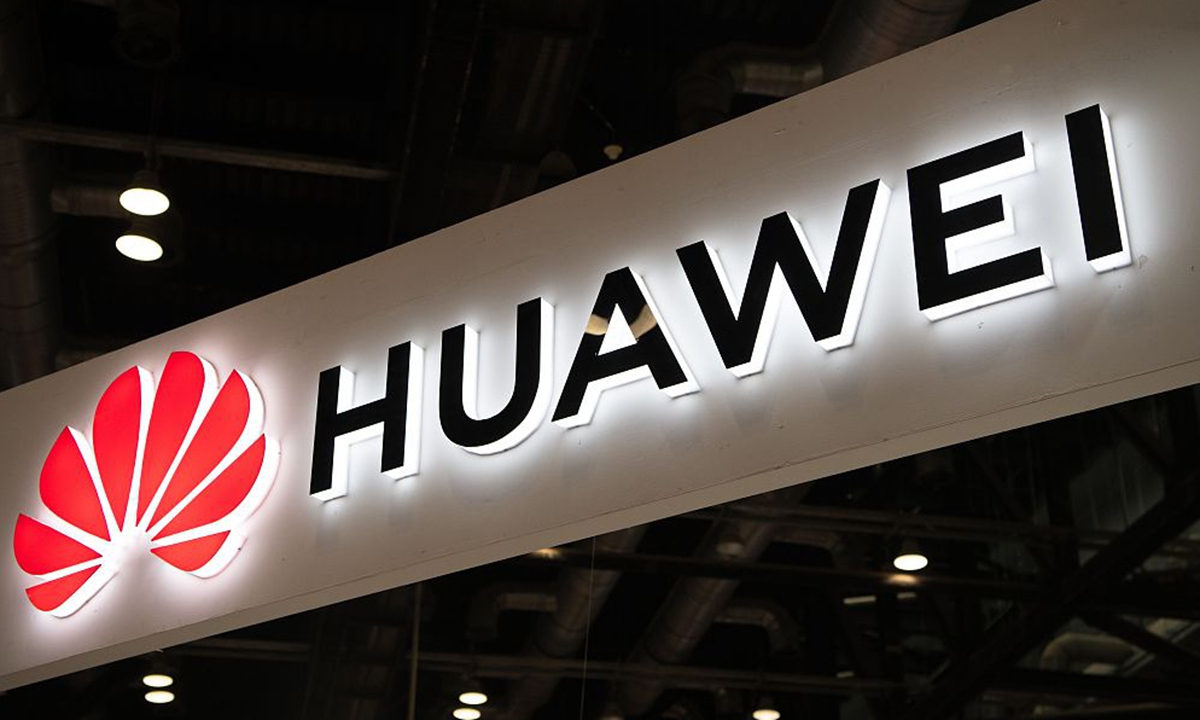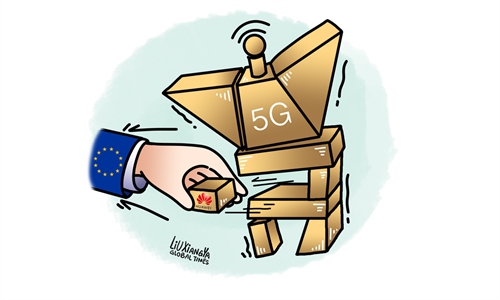EU industry chief's obstruction of China's 5G operators goes against current, will lead Europe nowhere: experts

Huawei Photo: VCG
Amid a series of close interactions between China and Europe in recent months, an undercurrent has surfaced against bilateral cooperation, as EU industry chief Thierry Breton on Thursday urged more member states to restrict China's Huawei and ZTE 5G telecoms networks, citing so-called risks to the bloc's collective security.
Observers believe that such actions go against the current and will lead Europe nowhere, urging Europe to maintain its strategic autonomy and not let noise from the US affect China-Europe relations.
Breton has in recent weeks voiced concerns that some EU countries still have perceived high-risk components in their 5G core networks, citing "intrusive third-country laws on national intelligence and data security," Reuters reported on Thursday, in a veiled reference to China.
Two years ago, the European Union adopted guidelines that called on its 27 member states to assess the risk profile of suppliers on a national or EU level, and restrict or ban high-risk 5G vendors from core parts of their telecoms networks.
The EU's internal market commissioner pointed out that only 10 of the 27 have used these prerogatives to restrict or exclude "high-risk" vendors, as the majority of member states have been "too slow" in their actions, which created a major dependency for the EU and "serious vulnerabilities."
Responding to the issue, Chinese Foreign Ministry spokesperson Wang Wenbin on Friday slammed the European Commission's claim as being a typical "presumption of guilt" when it alleged that Huawei and ZTE pose security risks without providing any evidence.
Chinese service providers have been operating in Europe for many years, and have not only never posed a threat to the region's security, but have also played a significant role in promoting the development of the telecommunications industry in Europe, creating considerable economic and social benefits.
The European Commission's claim is a blatant violation of the rule of law and disregards the EU's professed principles of market economy, free trade, and fair competition, Wang said, urging the EU to avoid politicization and refrain from suppressing foreign companies under the pretext of security.
The 5G hype is, in essence, the US using security as a pretext to restrict China's advanced technology development and demanding that Europe follow suit by politicizing the issue, Sun Keqin, a research fellow at the China Institutes of Contemporary International Relations, told the Global Times on Friday.
Europe has been increasingly reliant on the US in terms of security in recent years, especially after the Russia-Ukraine conflict, and as a price for that, Europe must make more concessions, Sun noted, but the China ban has been met with strong dissatisfaction and debate among EU members.
Telecom providers in Europe have switched to using Huawei equipment over the last decade, as the Chinese company supplied gear that was cheaper but of high technology, according to telecom experts.
"The cost of replacing Huawei and ZTE is enormous, and the replacement cycle is relatively long. It can even be said that banning the Chinese service providers is equivalent to cutting off the countries' own opportunities in the development of 5G," Fu Liang, an independent tech analyst, told the Global Times on Friday.
It is estimated that it would cost billions of euros to rip out and replace Huawei equipment in European countries, potentially burdening telecom companies already sitting on huge debts, a Reuters report said.
Europe should not let noise from the US affect China-Europe relations, which have been experiencing "a comprehensive restart" since the end of last year, with dialogues and exchanges in various fields being promoted, experts said.
Chinese Premier Li Qiang is set to embark on his first overseas trip as premier to Germany and France on Sunday, strengthening economic and trade ties with two of the European continent's biggest economies.
In Germany, Li is to hold the seventh China-Germany inter-governmental consultation, and then head to France to attend the Summit for a New Global Financing Pact, the Chinese Foreign Ministry announced on Thursday.
Li's upcoming trip follows a series of close interactions between the two sides, with Chinese President Xi Jinping receiving German Chancellor Olaf Scholz in Beijing in November 2022 and French President Emmanuel Macron in April.
Chinese Vice President Han Zheng visited Portugal and the Netherlands in May, which was closely followed by a visit by State Councilor and Foreign Minister Qin Gang to Germany, France and Norway.
The frequent exchanges between state leaders, senior officials and business representatives of China and Europe highlight the great importance the two sides have attached to each other, as both sides have been active in maintaining high-level and high-frequency exchanges and dialogues to stabilize the global situation and promote economic recovery, Cui Hongjian, director of the Department of European Studies at the China Institute of International Studies, told the Global Times.


